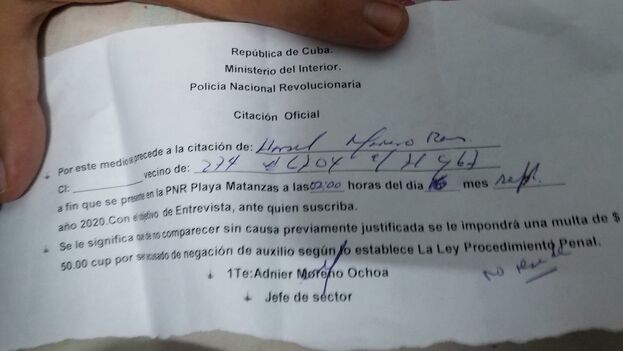
![]() 14ymedio, Luz Escobar, Havana, 17 September 2020 — The young influencer and reporter Jancel Moreno was summoned this Wednesday afternoon by the police of the city of Matanzas and was threatened with up to four years in prison if he does not stop publishing criticism against the Cuban authorities on social networks.
14ymedio, Luz Escobar, Havana, 17 September 2020 — The young influencer and reporter Jancel Moreno was summoned this Wednesday afternoon by the police of the city of Matanzas and was threatened with up to four years in prison if he does not stop publishing criticism against the Cuban authorities on social networks.
Moreno, who is also a contributor to the ADN portal, received a summons to appear at La Playa police station, in the city of Matanzas at two in the afternoon on September 16, as previously reported on social networks and it became — in his opinion — in the “chronicle of an announced threat.”
“I arrived just before 2:00 pm at the door of the Station where they had summoned me. An officer with an authoritarian and even despotic manner collects my identity card (2:20 pm) at approximately 3:50 a.m. The older man calls me, we go upstairs. He introduced himself but I don’t really remember the name (it is also false) and then the talk began.”

The officer showed Moreno a folder with dozens of his publications on Facebook and questioned whether he should follow the influencer Alex Otaola and the opponent José Daniel Ferrer, among others, on that social network. “It was really impossible to enter into a debate, because he will not change his position nor will I mine, so I dedicated myself to listening to him and nodding my head.”
The older man let the reporter know that it was a “preventive” summons and that he could face four crimes for his publications on the networks. Enemy propaganda, contempt, incitement to crime and propagation of an epidemic are the accusations to which he is exposed. The penalty “for simply posting on social networks” can be up to 3 or 4 years of deprivation of liberty, Moreno explained after leaving the interview.
Jancel Moreno had received the police summons last Tuesday and the document was signed by the Lieutenant Adnier Moreno Ochoa, head of the sector of the area where he temporarily resides in the city of Matanzas. According to the officer of the National Revolutionary Police (PNR) who gave him the summons, the appointment “would be for an interview with the chief.”
“If for thinking differently, raising my voice, I have to receive a thousand of these, well I will collect them, because I am not a criminal,” he wrote on his Facebook account.
Although the document claimed that the appointment was for an “interview”, Moreno believes that it was an interrogation full of threats that lasted more than an hour.
As of July 2018 Decree Law 370 came into force, emphasizing that Cuba is a computerized society, but the regulation warns that it is an “effective means for the consolidation of the conquests of socialism and an instrument for the political defense of the Revolution.”
In its article 68, Decree Law 370 describes a series of contraventions that imply extensive control over the Internet, and range from the prohibition against hosting websites on servers located abroad to limitations on what users can publish on their personal networks.
“Disseminating, through public data transmission networks, information contrary to social interest, morals, good customs and the integrity of people” is one of the specific violations detailed in the Decree Law.
Decree Law 370 has led dozens of activists and journalists such as Mónica Baró, Camila Acosta and Iliana Hernández to be fined 3,000 pesos in recent months.
_________________-
COLLABORATE WITH OUR WORK: The 14ymedio team is committed to practicing serious journalism that reflects Cuba’s reality in all its depth. Thank you for joining us on this long journey. We invite you to continue supporting us by becoming a member of 14ymedio now. Together we can continue transforming journalism in Cuba.
